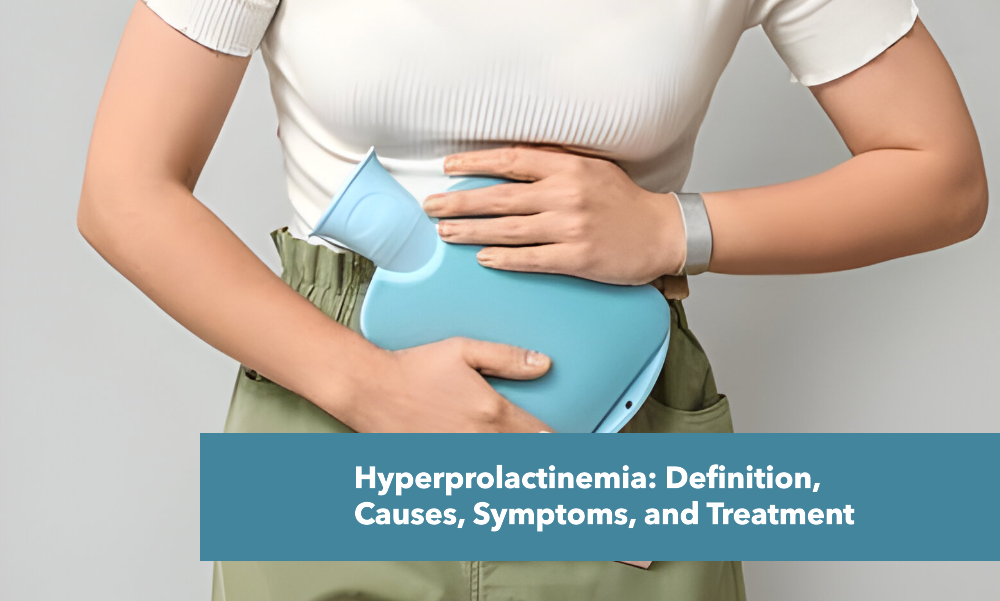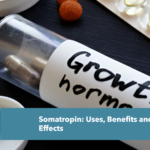Hyperprolactinemia means you have higher than normal levels of a hormone called prolactin in your blood. Prolactin is made by a pea-sized gland at the base of your brain called the pituitary gland. This hormone’s main job is to help women produce breast milk after childbirth.
Normally, your body tightly controls the amount of prolactin you have. But sometimes, things can go awry and prolactin levels rise. When this happens, it can cause some problems.
What is Hyperprolactinemia Meaning?
Hyperprolactinemia is a medical condition where you have too much prolactin in your blood. Prolactin is a hormone made by the pituitary gland in your brain that helps women produce breast milk after childbirth. In hyperprolactinemia, something disrupts the normal control of prolactin, causing high levels.
What is Prolactin?
Prolactin is a hormone produced in a pea-sized gland at the base of your brain called the pituitary gland. It plays several important roles in your body, but its main function depends on your sex and reproductive stage:
Pregnancy and breastfeeding: For women, prolactin is essential for preparing your body for breastfeeding after childbirth. It signals the mammary glands (breast tissue) to produce breast milk. During pregnancy, prolactin levels rise to help ensure milk production is ready when your baby arrives.
Men and non-pregnant women: In men and women who are not pregnant or breastfeeding, prolactin levels are generally much lower. It still has some functions, though, like helping to regulate your immune system and fluids in your body.
What is the Difference Between Hyperprolactinemia and Prolactinoma?
Hyperprolactinemia and prolactinoma are related, but they’re not exactly the same thing. Here’s a breakdown to clear things up:
Hyperprolactinemia: This is a medical condition where you have too much prolactin in your blood. Prolactin, as you know, is a hormone made by the pituitary gland that plays a role in reproduction and other bodily functions. In hyperprolactinemia, something disrupts the normal control of prolactin, causing high levels.
Prolactinoma: This is the most common cause of hyperprolactinemia. It’s a small, noncancerous tumor in the pituitary gland that overproduces prolactin. So, if you have a prolactinoma, it’s likely to lead to hyperprolactinemia.
Here’s an analogy to help understand the difference:
For example: Imagine your body is a factory, and prolactin is a product being made.
Hyperprolactinemia: This is like having too much of the product in storage. There could be several reasons for this, like a malfunctioning machine (prolactinoma) producing too much, or a problem with storage (other medical conditions).
Prolactinoma: This is specifically a malfunctioning machine (the tumor) that’s churning out too much prolactin.
What are the Types of Hyperprolactinemia?
There isn’t one single type of hyperprolactinemia, but doctors categorize it based on the underlying cause. Here’s a breakdown of the main types:
Prolactinoma: This is the most common cause, where a small, noncancerous tumor in the pituitary gland produces too much prolactin.
Other medical conditions: Sometimes, health problems like hypothyroidism (underactive thyroid) or chronic kidney disease can disrupt how your body controls prolactin, leading to high levels.
Medications: Certain medications can interfere with the normal production of prolactin, causing a temporary increase in its levels.
Who Does Hyperprolactinemia Affect?
Hyperprolactinemia can affect anyone, but it’s more common in certain groups:
Women: Women, particularly those in their childbearing years (age 15-45), are diagnosed with hyperprolactinemia more often than men. This is because fluctuations in hormones related to pregnancy and menstruation can sometimes lead to temporary increases in prolactin levels. However, if the high levels persist, it could be hyperprolactinemia.
People with pituitary tumors: A small, noncancerous tumor in the pituitary gland called a prolactinoma is the most common cause of hyperprolactinemia. These tumors can develop in anyone, but they seem to occur slightly more often in women.
People with certain medical conditions: Some health problems, like hypothyroidism (underactive thyroid) or chronic kidney disease, can disrupt the normal control of prolactin, leading to high levels in both men and women.
People taking certain medications: Certain medications can interfere with prolactin production, causing a temporary increase in its levels. This can happen in both men and women.
How Common are Hyperprolactinemia in Pakistan?
Hyperprolactinemia, a condition characterized by elevated prolactin levels in the blood, is relatively common in Pakistan. A few key points:
A study conducted at Aziz Fatimah Hospital in Faisalabad found that 61.4% of polycystic ovary syndrome (PCOS) subjects had hyperprolactinemia, compared to 36.4% of controls. The study also found a significant positive association between hyperprolactinemia and infertility in PCOS patients.
Levosulpiride, a prokinetic agent commonly used for dyspepsia in Pakistan, has been reported to cause hyperprolactinemia as a side effect. Two cases were reported where patients developed hyperprolactinemia after taking levosulpiride for 3-4 months, with prolactin levels normalizing after discontinuing the drug.
What are the Causes of the Hyperprolactinemia?
The causes of hyperprolactinemia include various factors such as tumors, medications, and other health conditions.
Pituitary tumor (prolactinoma): This is the most common culprit. It’s a small, noncancerous tumor in the pituitary gland that overproduces prolactin.
Other medical conditions: Certain health issues can disrupt prolactin control, leading to high levels. Examples include hypothyroidism (underactive thyroid) and chronic kidney disease.
Medications: Some medications can interfere with how your body makes prolactin, causing a temporary increase.
What are the Symptoms of Hyperprolactinemia ?
Women:
Irregular periods: This can include infrequent periods, very light periods, or periods that come at unpredictable times.
Milky nipple discharge (galactorrhea): This can happen even if you’re not pregnant or breastfeeding.
Difficulty getting pregnant (infertility): High prolactin levels can interfere with ovulation (egg release).
Decreased sex drive (libido): Prolactin can affect hormone levels that influence sex drive.
Men:
Erectile dysfunction: Trouble getting or keeping an erection.
Decreased sex drive (libido): Similar to women, prolactin can affect hormones related to sex drive.
Breast enlargement (gynecomastia): In some cases, men with hyperprolactinemia may develop enlarged breast tissue.
Vision problems: A large pituitary tumor can press on the optic nerve, affecting vision.
What are the Hyperprolactinemia Complications ?
Hyperprolactinemia can lead to complications if left untreated, but luckily they are often manageable. Here’s a breakdown of possible issues:
Infertility: In both men and women, high prolactin levels can disrupt hormone balance and make it difficult to conceive.
Bone loss (osteoporosis): Reduced estrogen and testosterone production (caused by high prolactin) can weaken bones, increasing the risk of fractures.
Vision problems: A large prolactinoma (tumor in the pituitary gland) can grow and press on the optic nerve, causing vision problems like headaches or sight loss.
Pregnancy complications: If you develop hyperprolactinemia during pregnancy, it can rarely lead to problems like high blood pressure or vision changes.
How and Where Hyperprolactinemia be Diagnosed?
Hyperprolactinemia is diagnosed through a combination of factors:
Symptoms: Doctors will first ask about your symptoms, such as irregular periods, milky nipple discharge, or trouble getting pregnant.
Blood test: This is the main tool for diagnosing hyperprolactinemia. It measures the level of prolactin in your blood. A doctor might recommend repeating the test to confirm high levels.
Imaging tests (optional): In some cases, if your prolactin levels are very high or the doctor suspects a tumor, they might recommend imaging tests like an MRI scan of the brain. This helps visualize the pituitary gland and see if there’s a tumor present.
Here’s where you can get diagnosed:
Hospitals: Most hospitals will have the facilities and expertise to diagnose hyperprolactinemia.
Clinics: Some specialized clinics, like endocrinology clinics that focus on hormones, might be able to diagnose and treat hyperprolactinemia.
What are the Treatments Available for the Hyperprolactinemia?
Hyperprolactinemia treatment depends on the cause and severity. Here’s a breakdown of the most common options:
Medication: This is usually the first line of treatment. Medications called dopamine agonists work by mimicking the effects of dopamine, a natural brain chemical that helps regulate prolactin levels. These can shrink tumors and lower prolactin production.
Surgery: If medication doesn’t work or there’s a large tumor, surgery might be an option. This is typically a minimally invasive procedure to remove the tumor in the pituitary gland.
Radiation therapy: This is rarely used for hyperprolactinemia due to potential side effects. It might be considered for very large tumors or in situations where surgery isn’t suitable.
Addressing underlying condition: If another medical condition is causing high prolactin levels, treating that condition can also help lower prolactin. For example, medication for hypothyroidism can help regulate prolactin production.
Which tablets are Available for Treating Hyperprolactinemia in Pakistan ?
In Pakistan, the two most commonly prescribed tablets for treating hyperprolactinemia are bromocriptine and cabergoline. These medications belong to the class of dopamine agonists and are effective in reducing prolactin levels and managing the associated symptoms of hyperprolactinemia. Cabergoline has been found to be more effective than bromocriptine in reducing persistent hyperprolactinemia, amenorrhea/oligomenorrhea, and galactorrhea. Both drugs have shown efficacy in treating hyperprolactinemia and are commonly used in clinical practice in Pakistan.
How Dostinex (cabergoline) Tablets are Helpful in treating Hyperprolactinemia?
Dostinex (cabergoline) tablets can be helpful for treating hyperprolactinemia because they target the root cause of the problem in many cases. Here’s how it works:
Dopamine connection: Remember, prolactin is a hormone made by the pituitary gland, and normally our body tightly controls its production. In hyperprolactinemia, this control goes awry, and prolactin levels rise. Dostinex is a dopamine agonist, which means it mimics the effects of dopamine, a natural brain chemical.
Lowering production: Dopamine normally helps regulate prolactin production. By acting like dopamine, Dostinex can help lower the production of prolactin in the pituitary gland, bringing your levels back to a normal range.
Shrinking tumors: If your hyperprolactinemia is caused by a small tumor in the pituitary gland (prolactinoma), Dostinex can often shrink the tumor. This helps reduce prolactin production and improve symptoms.



